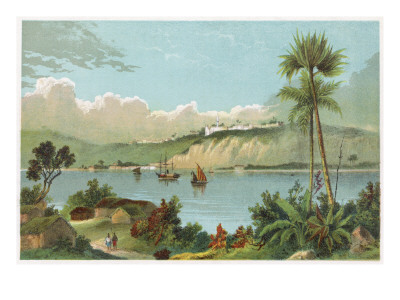Africa
North Africa:
° Algeria
° Egypt
° Libya
° Morocco
° Sudan
West Africa:
° Benin
° Cameroon
° Congo
° Cote d'Ivoire
° Gabon
° (Republic of the) Gambia
° Ghana
° Guinea
° Liberia
° Mauritania
° Mozambique
° Nigeria
° Sao Tome and Principe
° Senegal (Dakar)
° Sierra Leone
East Africa (The Horn of Africa): ° Djibouti
° Kenya
° Eritrea
° Madagascar
° Somalia
° Sudan
° Tanzania
° Zanzibar
Angola
In 1482, when the Portuguese first landed in what is now northern Angola along the South Atlantic in southwest Africa, they encountered the Kingdom of the Kongo, which stretched from modern Gabon in the north to the Kwanza River in the south. Mbanza Kongo, the capital, had a population of 50,000 people. South of this kingdom were various important states, of which the Kingdom of Ndongo, ruled by the ngola (king), was most significant. Modern Angola derives its name from the king of Ndongo.
By the end of the 19th century, a massive forced labor system had replaced formal slavery and would continue until outlawed in 1961. It was this forced labor that provided the basis for development of a plantation economy and, by the mid-20th century, a major mining sector. Forced labor combined with British financing to construct three railroads from the coast to the interior, the most important of which was the transcontinental Benguela railroad that linked the port of Lobito with the copper zones of the Belgian Congo and what is now Zambia, through which it connects to Dar Es Salaam, Tanzania.
The Portuguese gradually took control of the coastal strip throughout the 16th century by a series of treaties and wars. The Dutch occupied Luanda from 1641-48, providing a boost for anti-Portuguese states. In 1648, Brazilian-based Portuguese forces re-took Luanda and initiated a process of military conquest of the Congo and Ndongo states that ended with Portuguese victory in 1671.
Full Portuguese administrative control of the interior did not occur until the beginning of the 20th century.
Portugal's primary interest in Angola quickly turned to slavery. The slaving system began early in the 16th century with the purchase from African chiefs of people to work on sugar plantations in S o Tom , Princip , and Brazil.
December 5, 1856, Daily Alta California, San Francisco, California, U.S.A.
The Portuguese recently resumed occupation of the port of Ambriz, on the west coast of Africa, and have made it and the river Ambriz the boundary of the province of Angola. A royal decree of the 8th of October orders that all trading establishments shall have the license of the Governor and shall give bonds, when required, not to engage in the slave trade.
A Well-to-Do Person of Angola

Many scholars agree that by the 19th century, Angola was the largest source of slaves not only for Brazil, but also for the Americas, including the United States.
November 7, 1899, Los Angeles Herald
Los Angeles, California, U.S.A.
Everybody Grab
Paris, Nov. 7. The Berlin correspondent of the Figaro says that Emperor William is resolved to occupy Tigress, south of Angola, to the west coast of South Africa, if England occupies Delagoa bay.
Colonial economic development did not translate into social development for native Angolans. The Portuguese regime encouraged white immigration, especially after 1950, which intensified racial antagonisms. As decolonization progressed elsewhere in Africa, Portugal, under the Salazar and Caetano dictatorships, rejected independence and treated its African colonies as overseas provinces.
June 22, 1892, San Francisco Call, San Francisco, California, USA
A Portuguese Colony Captured by Boers.
London; June 21. Advices from the Portuguese colony of Angola, in West Africa, state that a large body of Boers entered the colony and proclaimed it a republic. Unless Portugal is able to send re-enforcements the Boers will retain the territory already seized and expel the Portuguese.
July 26, 1902, Sausalito News, Sausalito, California, USA
Natives in Angola Commit Atrocities.
Lisbon. The Governor of Zambesi has notified the authorities of the dispatch of a punitive expeditlon consisting of 300 Europeans and 700 natives from Chiuda for Barue to suppress a native insurrection in Angola. The natives there have committed many barbarous acts against resident Europeans, having destroyed their property and compelled an exodus of the white population to the coast.
November 8, 1911, San Francisco Call, San Francisco, California, USA
PORTUGUESE AFRICA AFLAME WITH REVOLT
Natives of Angola Massacring
European Settlers
LISBON, via frontier. Nov. 7. Serious news is received daily from Angola, the Portuguese possession in western Africa. A revolt among the natives is spreading rapidly and the blacks are burning and pillaging everything in their path. Notwithstanding the effort of the government to conceal the situation, it is known to be precarious. In the region of the Caeezere and Cassai, i warlike tribes attacked the settlements and tortured and massacred Europeans. There is terror among the settlers, who are abandoning their properties and finding refuge in the towns.
Africa: Angola1899. World's Fleet. Boston Daily Globe
Lloyds Register of Shipping gives the entire fleet of the world as 28,180 steamers and sailing vessels, with a total tonnage of 27,673,628, of which 39 perent are British.
| Great Britain | 10,990 vessels, total tonnage of 10,792,714 |
| United States | 3,010 vessels, total tonnage of 2,405,887 |
| Norway | 2,528 vessels, tonnage of 1,604,230 |
| Germany | 1,676 vessels, with a tonnage of 2,453,334, in which are included her particularly large ships. |
| Sweden | 1,408 vessels with a tonnage of 643, 527 |
| Italy | 1,150 vessels |
| France | 1,182 vessels |
For Historical Comparison
Top 10 Maritime Nations Ranked by Value (2017)
| Country | # of Vessels | Gross Tonnage (m) |
Total Value (USDbn) |
|
|---|---|---|---|---|
| 1 | Greece | 4,453 | 206.47 | $88.0 |
| 2 | Japan | 4,317 | 150.26 | $79.8 |
| 3 | China | 4,938 | 159.71 | $71.7 |
| 4 | USA | 2,399 | 55.92 | $46.5 |
| 5 | Singapore | 2,662 | 64.03 | $41.7 |
| 6 | Norway | 1,668 | 39.68 | $41.1 |
| 7 | Germany | 2,923 | 81.17 | $30.3 |
| 8 | UK | 883 | 28.78 | $24.3 |
| 9 | Denmark | 1,040 | 36.17 | $23.4 |
| 10 | South Korea | 1,484 | 49.88 | $20.1 |
| Total | 26,767 | 87.21 | $466.9 | |





 Copyright ~ 1998-2018.
Copyright ~ 1998-2018. 